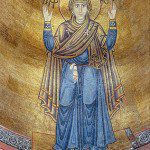![St. Augustine by Philippe de Champaigne [Public domain], via Wikimedia Commons](https://wp-media.patheos.com/blogs/sites/637/2016/09/Saint_Augustine_by_Philippe_de_Champaigne-235x300.jpg)
Great are You, O Lord, and greatly to be praised; great is Your power, and of Your wisdom there is no end. And man, being a part of Your creation, desires to praise You, man, who bears about with him his mortality, the witness of his sin, even the witness that You “resist the proud,” — yet man, this part of Your creation, desires to praise You. You move us to delight in praising You; for You have formed us for Yourself, and our hearts are restless till they find rest in You.[1]
At the core of our being, there is an inner longing for the absolute good. We all long for God. We might not know it. We might try to deny it as we seek some lesser good thinking it could serve as our absolute good. But only God is the one who can completely satisfy our heart’s desires.
In many of his early writings, such as his very important On Free Choice of the Will, St. Augustine explored how we go about our search for God by seeking for that which we think is good and so believe will make us happy. The problem is that we misconstrue what is and is not good, and so often end up seeking some limited good which we can easily perceive while not realizing such a good is imperfect and riddled with consequences which will leave us unsatisfied. Sin is the embrace of some lesser, disordered good as either being the absolute we desire or that which leads us farther away from that good, which is God. For God is the source of every good, and he is himself the highest and greatest good.[2] All that we seek and desire from a limited good will be attained in our union with God. This is why only with and in God can there be true rest for our hearts. We are restless because we constantly search after the good which satisfies. It is only when we rest in the love of God that we get that good, and by gaining God we also get through him all other goods which are helpful and appropriate for us.
Love is what brings us into union with God. God is love, and it is in the realization that he is love, theology can explore and come to represent the Trinity as well as explain how and why God can become man and remain God in the incarnation.[3] Love brings God to us, and love therefore lifts us up to be with God. For love opens us up to reach out beyond ourselves, overturn the egotistical barrier we have made between us and all that is not us, so that we can then unite with others in and through acts of love. When we do so, when we consummate that love, we find ourselves no longer an individual cut off from the rest of the world.
When our love unites us to some other limited lover, like ourselves, the union is great and a good to be praised, but what we get out of it is limited, because both of us involved in that union are limited, contingent beings. And yet, in that union, if it is good and pure, we are participating in an image of the love and union which we are to have with God. We are to love God and experience God’s love for us, and in the reception of that love, the bountiful joy shall be the foundation for that love to grow and be shared with others.
In this way, our love for another, such as in the just, chaste love between a man and a wife, can be used as a way to help us understand the relationship we are to have with God. Love between two on earth is analogous to the love of between us and God. The greater the love, the more appropriate the analogy. This is why when we read about great love being found in the world, it is often used to represent not just that love itself but a way in which the higher, mystical forms of love can be demonstrated in literary form. Likewise, those who might not have such an earthly love, knowing the analogous nature of their love for God, still will be able to employ and construct representations of it with conventional, earthly loves while having no real earthly object intended by their words. In the literature surrounding love mysticism, we will find examples of both – those who find their union with God manifested in and with an earthly love, and those who will find themselves united with God and expressing that union through conventional similes. The intoxication of love will be experienced in both occasions. Those who are familiar with it in earthly love will be able to appreciate it when expressed about divine love, and likewise, those who have experienced it with their union with God will be able to appreciate and understand its earthly analogue. This intoxication is often seen similar to the effect felt drinking alcohol, so that it is quite common to find mystical representations of love are expressed as if that love itself were a wine being drunk, indicating the various impacts such love can have on us and the way we experience the world.
![St. Francis of Assisi by Francisco Ribalta [Public domain], via Wikimedia Commons](https://wp-media.patheos.com/blogs/sites/637/2016/09/Ribalta-san_francisco-prado-232x300.jpg)
Since he is love, God who is the absolute good, will give to them what he believes is best according to their ability to receive his love and the context in which that love is being shared. To some, this means God will seem to vanish, making his great lovers seek him out further, playing, as it were, hard to get so that in their pursuit for him they can be transformed and made ready to receive his love. For others, he comes to them to give him the gifts of the beloved, tokens of his love so that they know he loves them and that he is willing to engage them further with his love. There are those who find themselves so taken in by the love of God that they lose themselves in God only to find themselves at one with God, burning up in that love like a moth in a flame. And then there are those who go even further, and find themselves resurrected by God’s love, where God takes what they have given, their full self, and gives them themselves back in and through is gift of love: in the consummation of their love with God, they find themselves, their true selves, in God. They die to the self, to the ego and all that holds them away from God, only to find the love of God then shows to them their original face, their real person, who is made in the image and likeness of God, and so capable of reflecting that love which is God.
More to Come
[1] St. Augustine, Confessions in NPNF1(1): 45.
[2] Or, we can say following Pseudo-Dionysius, he is beyond what we say is good, and so even the term good is less than what is appropriate for him.
[3] Richard of St. Victor, though not the only one to reflect on how God as love can serve as the foundation for our image of God and how our idea of God should be Trinitarian, is certainly to be commended to be one of the best representatives of this tradition in his On the Trinity. It is easy to read this work through the lens of modern positivistic logic and not understand the strength of his presentation; we have to look and read it under the higher ontological understanding which, though employs human logic, is not trapped by it.
Stay in touch! Like A Little Bit of Nothing on Facebook:
A Little Bit of Nothing













